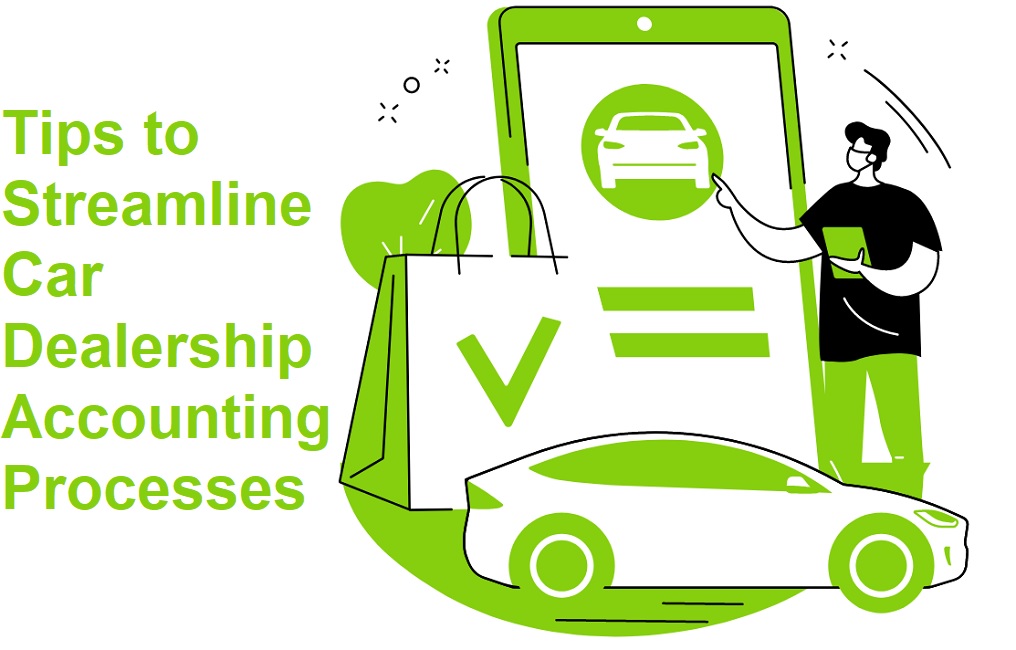Accurate, timely accounting information is essential to car dealership profitability. Yet, much time is spent on manual processes like tracking past-due invoices and paying vendors.
The good news is that implementing new technology in dealer accounting can transform the department for the better. Here are four tips to help you re-engineer your dealership's accounting processes for increased efficiency.
Top 4 Tips to Streamline Car Dealership Accounting Processes
1. Automate as Much as Possible
More well-managed accounting processes help to reduce duplication that might result in duplicate entries. Simplified bookkeeping can also save time that would otherwise be wasted on manual data entry and accounting equation paperwork. Dealerships may now focus on what matters: assuring profitability.
Most auto dealer accounting software programs include a wide range of tools that can be customized to meet specific business needs. For instance, some auto dealer accounting software programs allow managers to create customizable reports and dashboards to analyze sales trends or business performance metrics.
Another feature commonly found in top-tier automotive dealer accounting software is a tool that can assist with expense reporting. The tool will help track all deductible expenses and maximize tax deductions. Some tools will even let users snap pictures of receipts to attach to their reports. Additionally, some auto dealer accounting software tools can assist with service department billing by allowing mechanics to log their hours and generate customer invoices quickly and efficiently.
Another important tool is a vehicle tax preparation software program that helps to manage the complex process of managing federal and state taxes. The software will automatically calculate taxes due based on local regulations and can even store customer information for documentation. Most of these software solutions are now in the cloud to enable remote access and collaboration with team members.
2. Focus on Reconciliation
While running a dealership may be challenging, rock-solid accounting is necessary to keep a business functioning. This is especially true of reconciliation, which entails checking to make sure that transactions documented in the general ledger also appear on your monthly bank statements. Reconciliations can help you spot inconsistencies or fraud that otherwise might slip through the cracks.
The good news is that you can automate this process, which makes it easier and faster for accounting teams to check balances.
There are many reasons why the balances in your accounts and cash might differ, including a simple miscalculation or even some internal theft behind the scenes. If you regularly reconcile your accounts, these discrepancies will likely be avoided, leading to bad management decisions and potentially even a cash shortfall. This is why reviewing these accounts regularly through a mandated and streamlined reconciliation process is imperative. This will ensure that your cash balance is accurate and that you have a clear picture of how much money is coming in and going out of your business at all times.
3. Create Internal Controls
Even with the best systems and automation, your dealership still needs strong internal controls. Unfortunately, many dealerships don't prioritize these, leaving them vulnerable to employee theft and other financial irregularities.
The first step to establishing these controls is to determine the risk factors your dealership faces by conducting a risk assessment. This should include evaluating processes susceptible to human error and identifying potential impacts on your business if these errors occur. This process can also help you prioritize processes to automate or transition from paper to digital.
Next, you must document and implement internal control policies informed by your risk assessment results. Segregation of duties is a must, which includes having someone other than the cashier fill out bank deposit slips and perform bank reconciliations. Additionally, dealerships should have policies requiring someone to verify all parts purchases. Parts purchases should be compared to inventory management system records and physical counts of high-dollar items such as sound systems and tire rims.
In addition to these preventative measures, consider adding employee dishonesty coverage to your insurance policy. This will reimburse the dealership if an employee steals assets, allowing you to recoup some losses. While this isn't a foolproof solution to eliminating fraud, it can significantly reduce the likelihood of loss and recovery costs.
4. Automate Time-Sucking Processes
Even the most basic task automation can help save dealerships massive amounts of time and money. These time-sucking tasks, like tracking past-due invoices or paying vendors, differ from the flashiest parts of a car dealership's business. Still, they're necessary to ensure that all aspects of the business are running smoothly. If they are managed, a company can avoid trouble with its creditors and be allowed to ship parts or provide service.
Using software to automate these processes will ensure employee and customer satisfaction. It can also help reduce costs since fewer people must manage them, and more information can be tracked more accurately.
In addition, some of these automation tools can help with other dealership areas. For example, a dealer management system (DMS) can track inventory levels, calculate daily sales reports and generate customizable reports for the entire store or by product line. Many auto dealer accounting software solutions are now cloud-based and accessible on any device, which makes it easier to work from anywhere in the world.
Lastly, an automated payables (AP) system can replace paper and streamline the accounts payable process by eliminating time and cost. It will read bank records daily, match outstanding checks that have cleared, and automatically update the payables check file.








COMMENTS